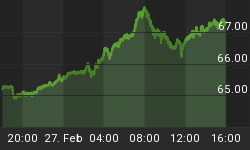The most recent batch of economic stats was even more disappointing than usual, resulting in a cliff dive for the Atlanta Fed's GDPNow US growth report:

It's the same around the world, with European, Japanese and Chinese numbers coming in below (already lowered) expectations. The implication? Interest rates in major countries will either remain extremely low or fall further from here. With $11 trillion of government bonds already trading with negative yields, that's an historically unprecedented prospect.
But for financial companies like insurers, pension funds, and money market funds, today's world is not just unprecedented, it's existentially threatening. Consider, for instance, the plight of Australian insurance companies:
Australia's Dwindling Bond Rates Set to Spur Insurer Risk-Taking
(Bloomberg) - Shrinking bond yields are challenging some of Australia's most conservative institutional investors -- the nation's general insurers -- as they struggle to generate income and safeguard thinning margins.
With yields on the safest securities plumbing record lows, companies such as QBE Insurance Group, Suncorp Group and Insurance Australia Group Ltd. may be tempted to put more money into areas such as corporate credit and equities to bolster returns, Fitch Ratings analyst John Birch said. Australia's general insurers saw their combined total return on investments plunge 47 percent to A$2.2 billion ($1.65 billion) last year, according to a report from Fitch.
"They might consider buying riskier assets, even though they have pretty strict constraints in regards to the credit ratings on what they can invest in," said Jason Kim, a money manager who helps oversee Nikko Asset Management's A$5 billion equities portfolio in Australia.
While Aussie bond yields are among the developed world's highest and appear more attractive than U.S. Treasuries or the negative interest rates on offer in Japan and Europe, they've nevertheless been dragged down by the global flight toward fixed-income assets and bets that the Reserve Bank of Australia will be forced to lower its cash benchmark from an already record low. Australia's 10-year government bond yielded 1.95 percent as of 5 p.m. on Wednesday in Sydney, after dropping to an unprecedented 1.84 percent on July 6.
Low yields are a potential headwind for the general insurance businesses that rely on investment income for about 40 percent to 65 percent of their pretax profits, according to a May 20 note from Andrew Adams, a Sydney-based insurance analyst at Credit Suisse Group AG. The insurers manage a combined A$52 billion, the bank said.
Obviously, Australia isn't a major factor in global financial markets. But the fact that it has higher interest rates than many other countries and its insurance industry still saw a 47% decline in return on investments last year implies that things are even worse for insurers in Japan and Germany, where yields on virtually all government debt are negative.
Such companies will have no choice but to roll the dice on "growth" assets like junk bonds and equities, which fundamentally changes the nature of their business model. Instead of steady, predictable income that guarantees the ability to pay off on policies when required, they'll have flush years and lean years, which might or might not coincide with the needs of their clients. They'll become hedge funds, in other words, high-risk investment vehicles that do well in good times and frequently fold up shop in bad.
With governments - which have borrowed tens of trillions of dollars that have to be rolled over every few years at prevailing interest rates, and corporations - which have borrowed trillions to buy back their own stock - already having devolved into high-rolling speculators, it's not a surprise that the once rock-solid insurance industry would do the same. Still, it leaves regular people looking for safety with one less place to hide out.
And of course it means the inevitable bailouts, when they come, will dwarf anything seen before.















